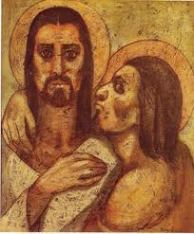St. Padre Pio once said something that I find beautiful to the point of tears: “The angels are jealous of us for one reason only; they are not able to suffer for God. Only through suffering can a soul say with certainty; ‘My God, You see I do love you!’”
The first reading prophesies about Jesus that “The Lord was pleased to crush him in infirmity.” He is called “a man of suffering, accustomed to sickness.” It continues that “we thought of him as afflicted by God and smitten.” Jesus Christ never married. Never had children. That made him strange within his culture already. He was doomed to be misunderstood and even abandoned by his friends, not to mentioned rejected, falsely accused, mocked and crucified by the very people to whom he was sent—the people that he loved the most. The prologue to the Gospel of John eloquently brings out this tragic point: “He came to his own, and his own did not accept him.”
I could go on and on, but there is no need. Let me ask you a simple question: Does this sound to you like a man who is blessed by God? Does the picture I just painted sound like the favorite and only son of the Most High God, who is a tender Father? Mocked, lonely, accustomed to infirmity, afflicted, ridiculed, and finally killed?
And yet Jesus IS the one who is most blessed and most loved. But he appears to us today as one who is cursed and abandoned by God. I have to admit that this bothers me a little. Because at least on the surface, it doesn’t make much sense. It doesn’t compute. And yet this is our faith. This is what happened. We open our Sacred Scriptures and find that this is, in fact, the case. We can either accept it or reject it. But is there some knowledge, some inspiration, that might make it easier to accept?
Do we not accuse God sometimes of not giving us more gifts or “blessing” us more when we truly try to pray and sacrifice for him? Maybe YOU don’t. Let’s talk about me. I do.
Let’s actually consult Jesus himself concerning what it means to be blessed or happy. What does he say about it? Remember the beatitudes? Blessed are the sorrowful, for they shall one day be comforted. Blessed are the pure, for they shall see God. Blessed are those who are persecuted for theirs is the kingdom of heaven…. Jesus gives us a list of things that are incredibly difficult to do: to be pure, just, persecuted, sorrowful…and calls them HAPPY. BLESSED. It seems that Jesus was giving us a “heads up” on what it means to be blessed. When Jesus first announced to his disciples that he was going to be falsely accused and crucified, Peter pulled him aside and told him that he wasn’t thinking right. “You are the master, the teacher, the Son of God. You are the Blessed One. Of course this will not happen to you.” And Jesus rebuked him and called him, “Satan.” And then said, “You are thinking as man thinks, not as God thinks.” (Matt 16:23) Who has the right to tell us what it means to be happy and blessed? Who is the one who created the heavens and earth with a word? I think we had better bow our necks to God and take his definitions to heart rather than make up our own. Maybe our definition of someone who is blessed by God needs a bit of a makeover. Jesus doesn’t look very blessed, does he? Stop for a moment and think. Ever felt a fairly great amount of suffering in your own heart, or observed it in another, and made the judgment that God was not blessing or that he did not care
Look at Jesus on Good Friday and then reconsider if this is true. The most loved son of the universe is exactly the one who is the most punished and afflicted. Today is worth us rethinking what happiness means, what blessing means, and what suffering means.
The difference between God’s definition of someone who is blessed and man’s hinges primarily on two things:
1) God is thinking of the long view. He is thinking about being happy eternally with him in heaven. We think of the world and the now, even though in comparison with heaven it is like a drop in a bucket. The Devil offers us the following deal: I will give you what you want now and it may make you happy for a few days, weeks or even years, but ultimately it will poison you and drag you down to my kingdom forever. God offers THIS deal: I ask you to give me your suffering and your service now, I will console you in your sacrifice, and then I will give you eternal happiness for all eternity after you have suffered a little while.
2) This leads us to the second major difference of how God defines happiness and how human beings do. God views happiness as helping others. We often view it as helping ourselves.
God takes the long view—the view that sees heaven, and the true view of love—that view that looks to the good of the other, not myself. This is a hard view to take. It is hard because we have to see God’s view with the eyes of the Spirit. Our flesh nails us to this world and its pleasures. Our flesh, our instinct, our dreams our desires demand that I get MINE and I get it NOW. The flesh is powerful—sometimes attacking us with desires that seem like they are more than we can bear. That’s because they ARE more than we can bear. That is why we need a God like Jesus to help us bear them.
Yet it was our infirmities that he bore,
our sufferings that he endured,
while we thought of him as stricken,
as one smitten by God and afflicted.
But he was pierced for our offenses,
crushed for our sins;
upon him was the chastisement that makes us whole,
by his stripes we were healed.
We had all gone astray like sheep,
each following his own way;
but the LORD laid upon him
the guilt of us all.
I have two grandmothers. One of them was French, and the other one was Sicilian. It was my Sicilian grandmother who almost ruined for me that precious Catholic phrase, “Offer it up.” Sometimes this attitude can be abused, particularly when we are being sarcastic and basically telling somebody when we say this that life is pain and they should really shuttup about it. There is a TREMENDOUS difference between the phrase “offer it up” and “Suck it up.” (AND I WISH MY FATHER WERE HERE BECAUSE I WOULD LIKE HIM TO LEARN THIS PARTICULAR LESSION).
But offering it up is what Jesus did. God actually gave him the BLESSING of being able to take the penalty of someone else’s sins and place it on his back—and then he crushed that penalty with his suffering. Is there anyone in this church who DOESN’T love someone so much—a spouse, a child, a parent, a friend or family member—that we would not make the prayer to God, “God, please do not hurt them. Let the penalty fall on ME. Let me stand between them and hell. Let ME take your wrath. Please God, even kill me—just don’t harm them.” Hopefully everyone in church can say they love someone that much. If we, in our sins, can love that much, does it not make sense that this is exactly what Jesus told God the Father about the whole human race? And that BECAUSE Jesus did this, God highly exalted him and gave him a name above every other name? And so that what looked awful, cursed, crushed and afflicted is actually the happiest most blessed event that has ever taken place?
And because we are baptized in Christ’s body and because we receive his body in the Eucharist, WE ARE GIVEN THE SAME POWER THAT HE WAS GIVEN TO BEAR THE PENALTY OF SOMEONE ELSE’S SINS FOR THOSE WE LOVE, AND EVEN THOSE WE HATE.
Some theologians have called this great power, this great privilege of Christians to bear the sufferings of others for the sake of love by the name of REDEMPTIVE SUFFERING. It is this suffering—this thing that looks like a curse but is really a blessing—that Saint Paul refers to when he writes, “Now I rejoice in my sufferings for your sake, and in my flesh I am filling up what is lacking in Christ’s afflictions for the sake of his body, that is, the church.” (Col 1:24) This is the real meaning of “offering it up.” And it is this knowledge that should actually change the way that we look at the sacrifice of Jesus Christ, and the view of our own suffering as well.
Could it be possible that our sufferings are not really so bad when we look at it this way? Could it be possible that my wounds might actually heal another, and that if we wipe away the blood and the bruises we might actually find Heaven underneath? Have you ever been on a long hike up a mountain that was extremely difficult and been elated by the time you reached the summit? The reason why we are so elated is because it cost us so much effort to get there. Had there been no effort, our hearts are no so much impressed by the destination when it is finally reached. That reminds me of one of my favorite quotes by Coach Vince Lombardi when he says, “I firmly believe that any man’s finest hour, the greatest fulfillment of all that he holds dear, is that moment when he has worked his heart out in a good cause and lies exhausted on the field of battle – victorious.”
There is doubt that much of our suffering we create for ourselves. We sin and then we receive the penalty of our sinfulness in our bodies. But there is also a great deal of heartbreak that cannot be helped. There is a difference between the crosses that we build in our own private, selfish workshop and those that the Lord chooses for us. He helps carry the ones he gives us, and allow us to break under the ones we decide to carry on our own.
BUT ALL OF IT CAN BE OFFERED.
No tear need be wasted. No wound need be dealt that you can’t mark your own blood on the forehead of someone you love so that the Destroyer might pass over them. You need suffer not a single heartbreak that you can’t ask Jesus, “Take my broken heart, please, and be pleased to use the pieces to put someone else’s back together.” That is a prayer that because of what happened on Good Friday, NEVER goes unheard or unanswered.
May God give us the strength to make that prayer. For those who make that prayer, everlasting glory awaits. And that is very, very good news indeed.


